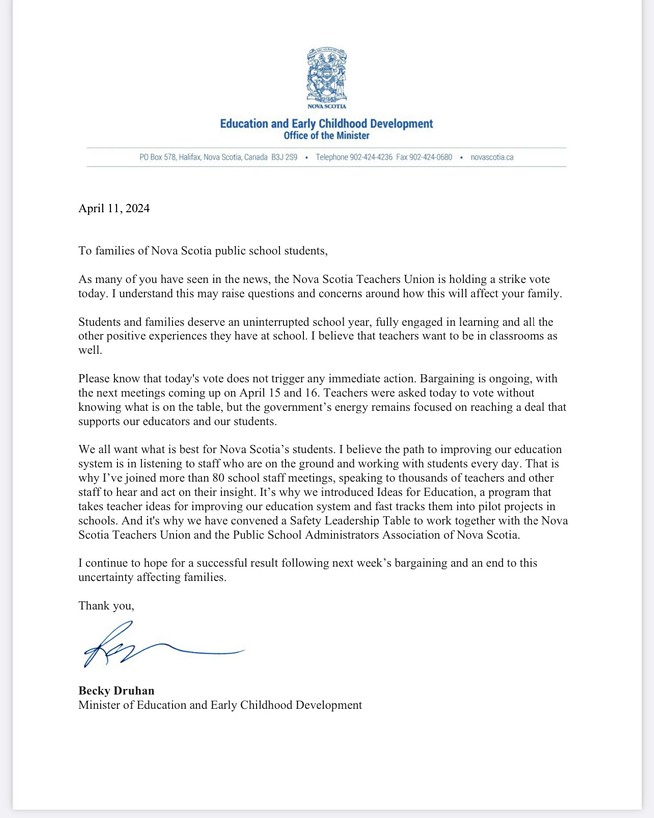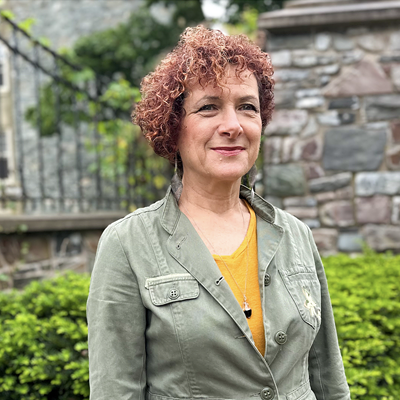On Apr. 11, a record-breaking 98% of teachers in the Nova Scotia Teachers Union–NSTU–voted in favour of a strike mandate.
98 per cent of Nova Scotia teachers vote in favour of strike mandate#nspoli #OurKidsCantWait pic.twitter.com/CGSbuw33P6
— NS Teachers Union (@NSTeachersUnion) April 11, 2024
This means that the union of over 10,000 teachers and educational specialists have voted to give the NSTU executive the authority to move into strike action, if needed, over what they describe as a lack of confidence in bargaining for a new collective agreement with their employer, the minister of education and early childhood development.
The union of teachers has been working without a collective bargaining agreement since theirs expired Aug. 1, 2023. They have been negotiating for a new agreement for over 10 months.
“The NSTU has a long history of getting agreements with the government without having to resort to this action,” NSTU president Ryan Lutes tells The Coast on Friday. Although a strike vote has happened before, Lutes says “98% of teachers willing to take job action is a record.”
Lutes is part of the union’s bargaining team. He says the province is not addressing key issues affecting teachers at the table and that needs to change. Following Thursday’s vote, Lutes says their focus now is on conciliation dates with the province on Apr. 15 and 16. “We're focused on getting a collective agreement at the table and hoping that 98% of teachers willing to authorize job action will send a message to the government that they need to come to the table ready to have more productive conversations.”
Following the strike vote results, the minister of education and early childhood development, Becky Druhan, issued a statement on the department’s website. It opens with, “While I’m of course disappointed at the vote results, I’m not surprised. Teachers were put in the difficult position today of voting while bargaining is ongoing and before they know what is on the table.
Today I want to reassure parents that the outcome of this vote has no impact on school operations and does not trigger a strike. This vote is only a distraction that has caused confusion and anxiety for students and their families.”
When asked why minister Druhan called the vote a distraction, she told The Coast, “a strike vote, particularly in relation to education, causes anxiety for families and for students and it has taken away focus both from the work that we’re doing within the system, in collaboration with NSTU and others, to address the important shared priorities that we have. It’s taking the focus away from our commitment to being at the bargaining table and negotiating an agreement.”
Minister Druhan says some of this work that is being distracted from extends beyond the collective bargaining agreement, including the Safety Leadership Table mentioned further down in her statement. Druhan says this group is a collaborative effort between NSTU, the province, and other experts, who are “evaluating, updating and ensuring we have a code of conduct in place that supports safety in schools.” Lutes and Druhan are both members of this group, which began to form in November 2023.
Lutes says they’ve met a handful of times and have had productive conversations, however he says “teachers in their classroom wouldn’t know that table exists in the sense that nothing has changed. Actually, they would say that things have gotten worse in the last three years,” in terms of violence in schools.
Lutes says that’s where the frustration comes from. The union and province know what the issues are facing teachers in the classroom–ballooning class sizes, lack of mental health supports for students, teacher burnout, declining government funding, rising violence at schools and staff shortages–but no meaningful change is showing up in the classrooms.
Druhan says many of these issues are 10 years in the making, and broader than any one collective agreement. She also says the province shares a commitment to address these issues, but it takes time and might not show up in the bargaining process. “The union is talking publicly about their priority around safety in schools, and that is absolutely a shared priority of ours. That work is underway to address issues that go beyond what bargaining can reflect, but there are elements at the bargaining table that support those shared priorities, as well.”
Druhan says she respects the bargaining process, which her Progressive Conservative government has demonstrated “through our bargaining with many other public sector employees and successfully negotiating deals with them. But…there are issues that we deal with that go broader than bargaining.” Druhan says she’s optimistic about reaching a tentative agreement in the coming weeks, but says this vote was taken “at a stage in bargaining…teachers don’t have the opportunity yet to see what might be on offer.”
In response, Lutes says all members of the union have seen the government’s initial bargaining proposal as well as the NSTU’s own initial bargaining proposal and that the union has been transparent with its members throughout the bargaining process. They’ve held information sessions in every region of the province where, Lutes says, teachers were able to clearly spell out “why the government is not taking teachers seriously–if they weren’t clear, they wouldn’t have voted ‘Yes.’ They knew exactly what they were doing, and for the government to continue spending time dismissing those concerns, I’d rather they put the time in to come to the bargaining table and show greater commitment to public education.”
Lutes says the minister’s “characterization of our strike mandate as a distraction is disrespectful to the vast majority of teachers who voted ‘Yes.’
“98% is an extremely resounding message,” he says. “That was a referendum on public education and a referendum on the state of education by whom I believe know it best: the teachers in our classrooms and schools everyday.
“Those are your Grade 3 teachers, those are your high school teachers, those are not militant members. They’re your teachers going into work everyday trying to do right by their students.”
Lutes says he hopes the government hears from this vote that teachers are “fed up with how things are and that they need to see improvements for themselves and for students and they’re not willing to do nothing and wait.”

Nathaniel Street is a parent of a child in Grade 1 in Halifax. He also took issue with the minister's letter that was sent to him as a parent, specifically that students and families want uninterrupted learning and that teachers voted without knowledge of what was on the bargaining table.
He wrote the minister a letter in response, saying, “I agree with you. Students and families should have an uninterrupted school year and I have the unwavering belief that this is the desire of teachers as well. Far more important than ensuring an ‘uninterrupted school year,’ which presumes that the most important function of our school system is consistency as a childcare service, students and teachers should be able to expect well facilitated learning environments and teachers should expect reasonable working conditions and fair compensation,” and, “Your effort to highlight that ‘teachers were asked today to vote without knowing what is on the table,’ is a deliberate attempt to undermine the general public’s faith in teachers and in the teachers union…”
Conciliation dates are scheduled for next week, on Monday and Tuesday, with both bargaining teams and a provincial conciliator which will aim to reach a tentative agreement and avoid a strike.
Says Druhan, “the best path right now is for the bargaining to continue and for the parties to be at the table in good faith, which is how our team is going to the table, to really focus on what the collective agreement can do to meet those shared priorities.” She says both sides need to come up with a new collective agreement that reflects those priorities while also recognizing that work is broader than the agreement itself. “We need to continue to collaborate together.”
Lutes says that teachers aren’t happy about the potential for a strike, because “teachers, who are some of the kindest, easy going people that I know, want to go to schools every day…But right now they're saying, ‘I'm doing my level best, but I'm not supported to the degree that I need to be to do right by students, and our students aren't being supported by the system in the way they deserve.’” Lutes says while no teachers want to strike, “the other part is that, resoundingly, teachers are prepared to take action, if it's needed, in the best interest of teachers and our students.”
On what he hopes to see from Premier Tim Houston’s office, Lutes says he’s heard premier Houston say he respects teachers and say “he thinks they do a really tough and great job–and I don’t get that same sentiment from the government’s negotiating team.”
Lutes says he doesn’t know where the disconnect is, but hopes that 98% of grassroots teachers authorizing a strike mandate gives the premier a message that maybe there’s a disconnect between him and the province’s bargaining team.













